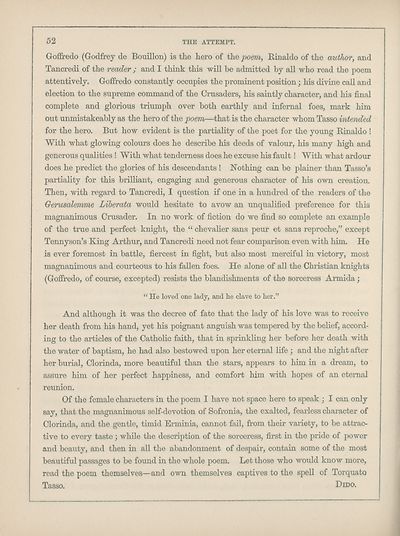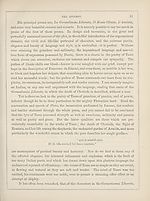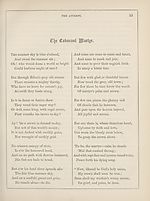Download files
Complete book:
Individual page:
Thumbnail gallery: Grid view | List view

52 THE ATTEMPT.
Goffredo (Godfrey de Bouillon) is the hero of the poem, Einaldo of the author, and
Tancredi of the reader ; and I think this will be admitted by all who read the poem
attentively. Goffredo constantly occupies the prominent position; his divine call and
election to the supreme command of the Crusaders, his saintly character, and his final
complete and glorious triumph over both earthly and infernal foes, mark him
out unmistakeably as the hero of the poem—that is the character whom Tasso intended
for the hero. But how evident is the partiality of the poet for the young Binaldo !
With what glowing colours does he describe his deeds of valour, his many high and
generous qualities ! With what tenderness does he excuse his fault ! With what ardour
does he predict the glories of his descendants ! Nothing can be plainer than Tasso's
partiality for this brilliant, engaging and generous character of his own creation.
Then, with regard to Tixncredi, I question if one in a hundred of the readers of the
Gerusalemme Liherata would hesitate to avow an unqualified preference for this
magnanimous Crusader. In no work of fiction do we find so complete an example
of the true and perfect knight, the " chevalier sans peur et sans reproche," except
Tennyson's King Arthur, and Tancredi need not fear comparison even with him. He
is ever foremost in battle, fiercest in fight, but also most merciful in victory, most
magnanimous and courteous to his fallen foes. He alone of all the Christian knights
(Goffredo, of course, excepted) resists the blandishments of the sorceress Armida;
" He loved one lady, and he clave to her."
And although it was the decree of fate that the lady of his love was to receive
her death from his hand, yet his poignant anguish was tempered by the belief, accord¬
ing to the articles of the Catholic faith, that in sprinkling her before her death with
the water of baptism, he had also bestowed upon her eternal life ; and the night after
her burial, Clorinda, more beautiful than the stars, appears to him in a dream, to
assure him of her perfect happiness, and comfort him with hopes of an eternal
reunion.
Of the female characters in the poem I have not space here to speak ; I can only
say, that the magnanimous self-devotion of Sofronia, the exalted, fearless character of
Clorinda, and the gentle, timid Erminia, cannot fail, from their variety, to be attrac¬
tive to every taste; while the description of the sorceress, first in the pride of power
and beauty, and then in all the abandonment of despair, contain some of the most
beautiful passages to be found in the whole poem. Let those who would know more,
read the poem themselves—and own themselves captives to the spell of Torquato
Tasso. Dido.
Goffredo (Godfrey de Bouillon) is the hero of the poem, Einaldo of the author, and
Tancredi of the reader ; and I think this will be admitted by all who read the poem
attentively. Goffredo constantly occupies the prominent position; his divine call and
election to the supreme command of the Crusaders, his saintly character, and his final
complete and glorious triumph over both earthly and infernal foes, mark him
out unmistakeably as the hero of the poem—that is the character whom Tasso intended
for the hero. But how evident is the partiality of the poet for the young Binaldo !
With what glowing colours does he describe his deeds of valour, his many high and
generous qualities ! With what tenderness does he excuse his fault ! With what ardour
does he predict the glories of his descendants ! Nothing can be plainer than Tasso's
partiality for this brilliant, engaging and generous character of his own creation.
Then, with regard to Tixncredi, I question if one in a hundred of the readers of the
Gerusalemme Liherata would hesitate to avow an unqualified preference for this
magnanimous Crusader. In no work of fiction do we find so complete an example
of the true and perfect knight, the " chevalier sans peur et sans reproche," except
Tennyson's King Arthur, and Tancredi need not fear comparison even with him. He
is ever foremost in battle, fiercest in fight, but also most merciful in victory, most
magnanimous and courteous to his fallen foes. He alone of all the Christian knights
(Goffredo, of course, excepted) resists the blandishments of the sorceress Armida;
" He loved one lady, and he clave to her."
And although it was the decree of fate that the lady of his love was to receive
her death from his hand, yet his poignant anguish was tempered by the belief, accord¬
ing to the articles of the Catholic faith, that in sprinkling her before her death with
the water of baptism, he had also bestowed upon her eternal life ; and the night after
her burial, Clorinda, more beautiful than the stars, appears to him in a dream, to
assure him of her perfect happiness, and comfort him with hopes of an eternal
reunion.
Of the female characters in the poem I have not space here to speak ; I can only
say, that the magnanimous self-devotion of Sofronia, the exalted, fearless character of
Clorinda, and the gentle, timid Erminia, cannot fail, from their variety, to be attrac¬
tive to every taste; while the description of the sorceress, first in the pride of power
and beauty, and then in all the abandonment of despair, contain some of the most
beautiful passages to be found in the whole poem. Let those who would know more,
read the poem themselves—and own themselves captives to the spell of Torquato
Tasso. Dido.
Set display mode to: Large image | Transcription
Images and transcriptions on this page, including medium image downloads, may be used under the Creative Commons Attribution 4.0 International Licence unless otherwise stated. ![]()
| Ladies' Edinburgh Debating Society publications > Attempt > Volume 3 > (66) Page 52 |
|---|
| Permanent URL | https://digital.nls.uk/104344024 |
|---|
| Attribution and copyright: |
|
|---|

